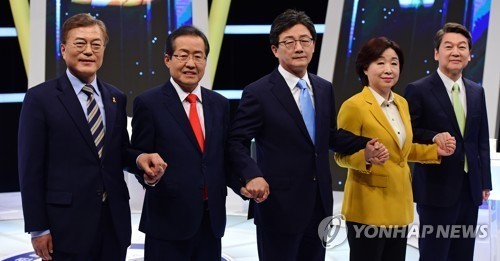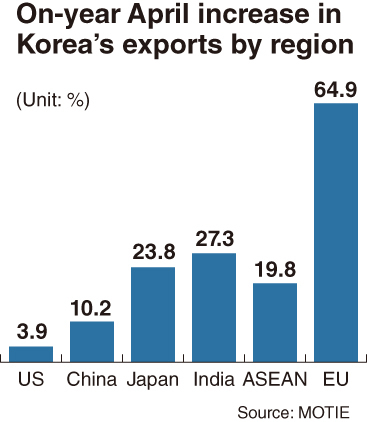Conspicuously missing from the five major presidential candidates’ campaign pledges is how they would address increasing external trade pressures on the country, particularly the protectionism pursued by US President Donald Trump, upon winning next week’s election.
During their debate on economic issues last week, the audience was apparently let down by their unfocused approaches to a rising US demand for renegotiating the bilateral free trade agreement that took effect in 2012.
 |
(Yonhap) |

None of the presidential candidates have suggested concrete and substantial trade policies alluding to such worries.
Moon Jae-in, the candidate of the liberal Democratic Party of Korea, pledged to maintain strategic ties with the US based on a military alliance and a free trade deal. Shim Sang-jeung from the minor progressive Justice Party said she would review the impact of trade accords Korea has concluded with the US and other countries on the domestic economy and society.
Their stances seem out of touch with the urgent need to deal with trade pressures from the Trump administration.
Ahn Cheol-soo, the candidate of the centrist People’s Party, made an ambiguous pledge to pursue trade diplomacy based on free trade deals that bring a virtuous cycle with the domestic economy.
The two conservative presidential candidates -- Hong Joon-pyo from the Liberty Korea Party and Yoo Seong-min of the Bareun Party -- did not mention trade policies in their 10 major campaign pledges.
Critics have said presidential candidates should pay more attention to trade issues, which hold the key to the country’s economic survival.
Priority should be given to lessening or defusing trade pressure from the Trump administration, which has blamed the trade deal with Korea for more than doubling the US’ bilateral deficit over the five years of its implementation to $27.7 billion last year.
“Whoever wins next week’s election needs to meet President Trump as soon as possible to share understanding on the importance of the bilateral alliance and the mutual benefits from the free trade deal in a larger context,” said Choi Nam-seok, a professor at Chonbuk National University.
While South Korea went through domestic political turbulence over the past months, China and Japan have moved to ease pressures from the new US administration through their leaders’ talks with Trump.
Kang In-soo, head of the Hyundai Research Institute, a private think tank, suggested separating renegotiation on the bilateral trade deal from discussion on sharing the cost of keeping US forces here.
He said Trump’s remark on the possibility of terminating the trade accord with Korea, which has benefited both sides, was seen as part of a negotiating strategy to draw more concessions from Seoul.
According to a report released by the US International Trade Commission last year, the US might have seen its 2015 deficit with Korea at $28.3 billion expand to $44 billion without the bilateral deal.
Shipments of three major US export items -- cars, pharmaceuticals and beef -- to Korea increased from $780 million, $880 million and $580 million in 2013 to $1.68 billion, $1.12 billion and $1.04 billion last year, respectively, according to figures from the Korea International Trade Association.
Korea’s accumulated investment in the US reached $51.2 billion over the five years since the trade pact came into force, while incoming investments marked just $20.2 billion.
Some experts say Seoul needs to be more aggressive in reducing the trade imbalance with the US, as Trump is preoccupied with cutting deficits, which he sees as a major factor behind job losses in the world’s largest economy.
Ahn Se-young, a professor at Sogang University’s Graduate School of International Studies, suggested Korea offer a plan for halving its trade surplus with the US over the coming five years mainly by increasing imports of US shale gas.
By Kim Kyung-ho (khkim@heraldcorp.com)




![[Herald Interview] 'Korea, don't repeat Hong Kong's mistakes on foreign caregivers'](http://res.heraldm.com/phpwas/restmb_idxmake.php?idx=644&simg=/content/image/2024/11/13/20241113050481_0.jpg)
![[KH Explains] Why Yoon golfing is so controversial](http://res.heraldm.com/phpwas/restmb_idxmake.php?idx=644&simg=/content/image/2024/11/13/20241113050608_0.jpg)

